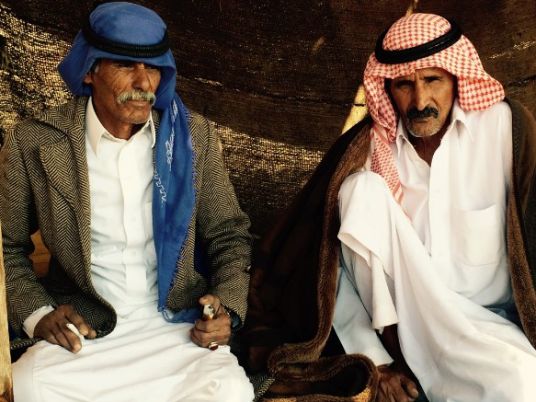Novelist Hamdi Abu Golayyel hails from a Bedouin village in the Fayoum area of Middle Egypt. His ancestors settled there in the first half of the 19th century, in the time of Egyptian Khedive Muhammad Ali, after emigrating from Libya. The origins of his tribe and their gradual abandonment of nomadic life feature prominently in his work, but the migration that most defines his own life and fiction is the one from his village to the bustling city of Cairo.
Abu Golayyel first attracted notice with "Thieves in Retirement" (2004), a novel about a Bedouin immigrant to Cairo who lives in the slums of Manshiyat Nasser (where, in real life, Abu Golayyel resided for many years). The unsettled narrator delivers a dark but very funny account of his thieving, lying, bullying of neighbors and his “persistent fear that they will unite against me.”
Then came Al Fa’il (2009). Although the title means “the laborer,” the English translation was entitled "A Dog with No Tail". The work is based on the many years in which Abu Golayyel toiled with construction teams in Cairo, while nursing the improbable ambition of becoming a writer. This novel–a clever and complex meditation on the shaky edifice that is identity and the “construction work” that is writing–won last year’s Naguib Mahfouz Medal.
Now Dar Merit, the publisher of Abu Golayyel’s previous works, has issued a collection of his early short stories. They focus on a subject–the author’s Bedouin heritage–that is central to his work, and are written in a style–conversation, self-referential, full of swift sarcasm–that will be familiar to readers of his novels.
Taken together, the stories form an exploration of Abu Golayyel’s Bedouin identity; an attempt to make sense of the gaps and contradictions between his tribe’s past and present, the codes it supposedly follows and the realities it faces, and, above all, the stories by which it defines itself.
We can tell almost immediately that these stories will be treated with skepticism rather than reverence. Early in the collection, the un-named narrator tells us: “In truth, I didn’t trust my grandfather’s story about the camel that was the reason for his brother’s murder…I tended to believe the stories that were spread in the village and that the children of the fellaheen would tell me during fights…[one of which was that] my uncle was killed by the Awlad Ali tribe when they caught him with the wife of one of their elders…”
The narrator also mocks his own story-making, his need to create a meaningful narrative for himself. The story “Father,” about his search for a replacement father-figure, opens: “I’ll make him a legendary father, I’ll lower my voice around him, I won’t raise my eyes to his face, I’ll get confused and throw my lit cigarette under the bed when I hear his voice, and let its fire consume the bed….so I can tell my friends–as they always told me–that my father caught me while I smoked, I got confused and it was a disaster, the bed burnt. No… I’ll swear to them that I put my cigarette in my pocket, because besides the fact that Bedouins don’t have beds to begin with, putting my cigarette in my pocket will establish the scene of confusion and lengthen my trembling in front of my father, making his awe-inspiring dignity a piercing truth.”
The search for a father-figure–for a compelling, traditional source of authority–is, of course, fruitless. The narrator’s identity crisis is such that he can’t even figure out how to choose between the words for “father” in the Bedouin dialect, Classical and Colloquial Arabic, and can’t bring himself to speak the word to the potential candidate.
The collection ends with a novella that explores an oft-referenced legend in Abu Golayyel’s work and his tribe’s history. The story as traditionally told goes as follows: Abu Golayyel’s grandfather, Aula, and his uncle, Ma’yuf, are in the desert hunting. They see a merchant with a caravan of ten camels. Ma’yuf insists on robbing him, even though according to tribal custom he should be left alone, as he is a guest on the tribe’s land. Aula doesn’t join his cousin as he approaches the merchant, but rather stays hidden behind some rocks. The startled merchant knocks Ma’yuf on the head with his staff, killing him. Aula shoots the merchant to avenge his cousin’s blood, takes the camels, and enters the village–and its lore–a hero.
Abu Golayyel tells this story and then immediately starts poking holes in it–perhaps Aula let his cousin do the dirty work on purpose? Perhaps it was even he who killed both the cousin and the merchant? “I’m possessed by a desire to betray the story-teller a little,” Abu Golayyel writes, before launching into several alternate accounts of the incident.
Yet for all his post-modern, satirical, deeply unromantic treatment of his tribe and its stories, Abu Golayyel’s preoccupation with them points to their power, to their necessity, to the role they continue to play in what he calls the “double” existence of his generation–even now that the tribes have settled on the edges of cities, and the deserts they once roamed “no longer exist at all, except inside them.”
Hamdi Abu Golayyel’s latest work
Tay Al-Khiyaam (Folding the Tents- Dar Merit, 2010)
"Thieves in Retirement" (Dar Merit, 2004; English edition from Syracuse University Press, 2006)
"A Dog with No Tail" (Dar Merit, 2009; English edition from American University in Cairo Press, 2009)




